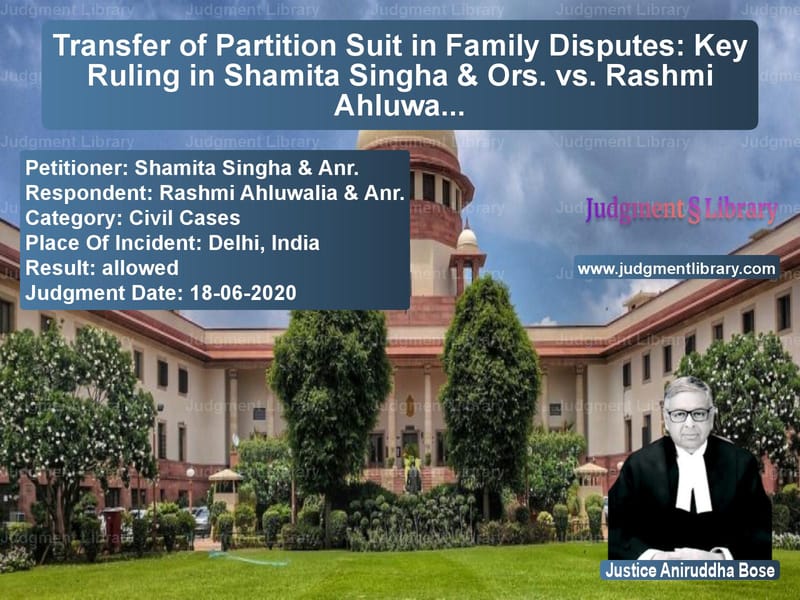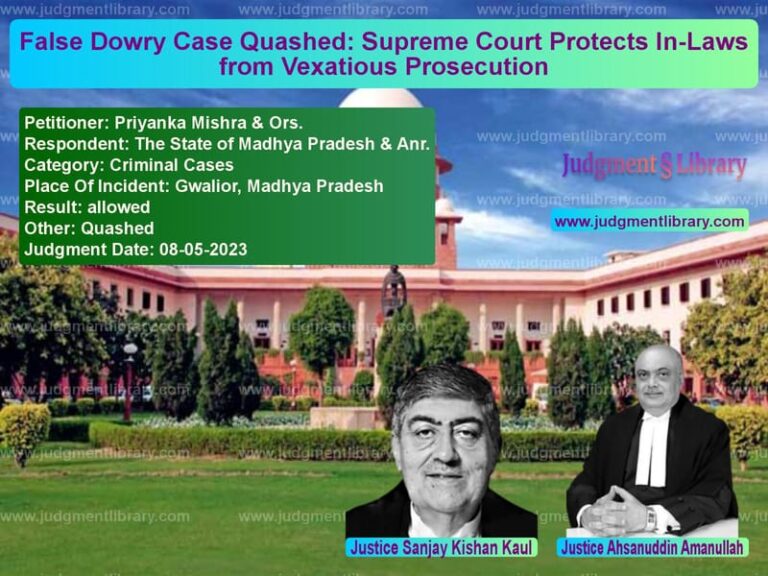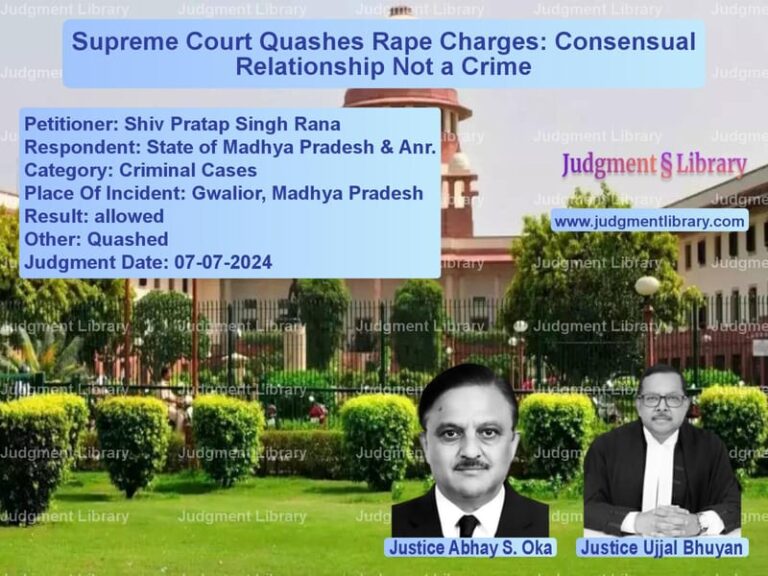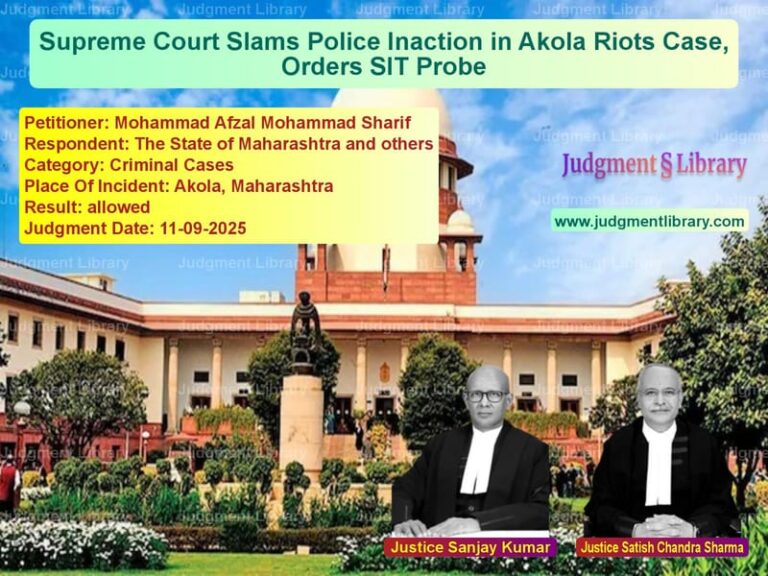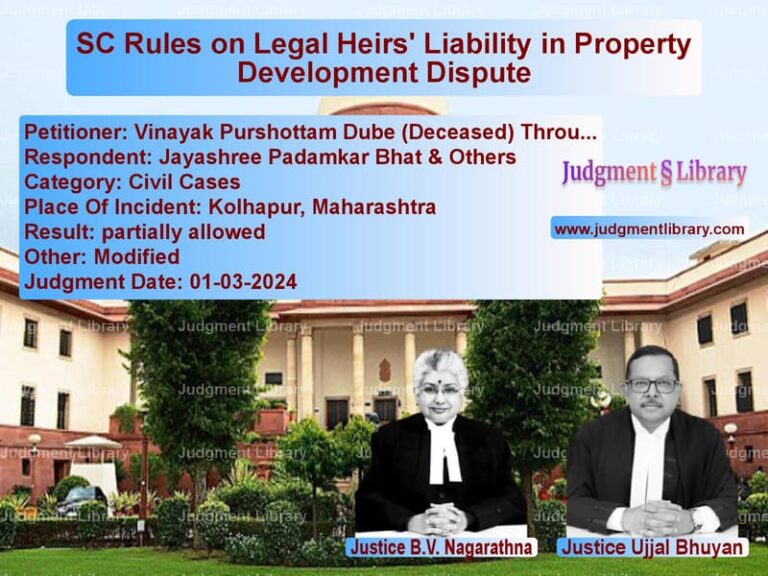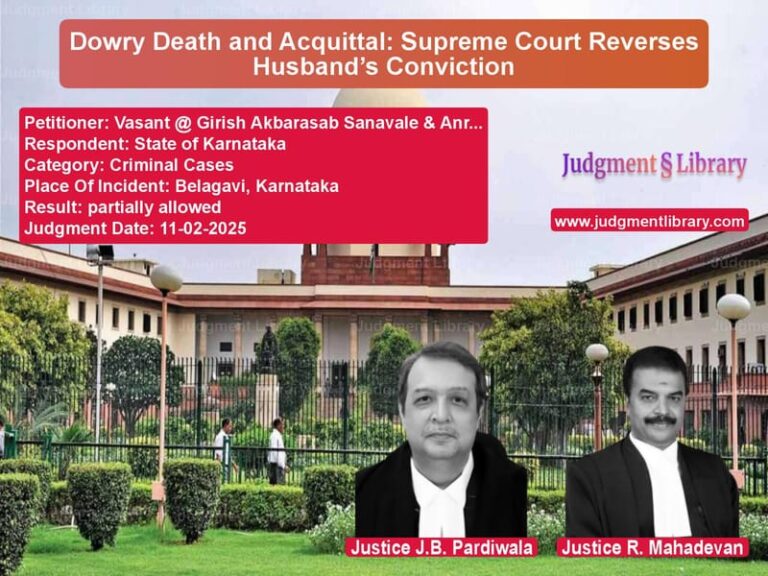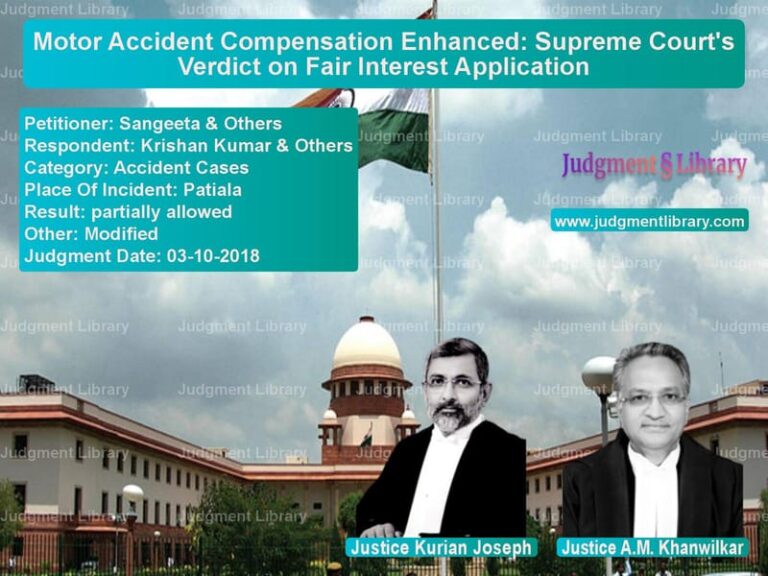Transfer of Partition Suit in Family Disputes: Key Ruling in Shamita Singha & Ors. vs. Rashmi Ahluwalia
The case of Shamita Singha & Anr. vs. Rashmi Ahluwalia & Anr. revolves around the legal question of transferring a partition suit filed in the Delhi High Court to the Bombay High Court. The petitioners, Shamita Singha and Masoom Singha, who are daughters of the deceased Pawan Kumar Singha, seek to transfer the partition suit to the Probate Court, where the legal validity of their father’s will is being contested. The deceased’s second wife, Rashmi Ahluwalia, and her daughter from a previous marriage are the respondents in the case, challenging the claim of the petitioners to a share in the deceased’s estate.
The petitioners argue that the Probate Court has the exclusive jurisdiction to determine the validity of the deceased’s will, and that the partition suit filed in the Delhi High Court should be transferred to the Bombay High Court, where the will’s validity is being adjudicated. On the other hand, the respondents argue that the partition suit should proceed in the Delhi High Court, as the assets involved are primarily located in Delhi, and the Probate Court is not competent to handle property-related disputes between family members.
The main issue before the Court was whether the partition suit, which involves the distribution of the deceased’s estate, should be transferred to the Probate Court or proceed independently in the Delhi High Court. The petitioners also contended that the decision on the validity of the will had a direct bearing on the partition suit and that both proceedings should be heard together to avoid inconsistent judgments.
Background of the Case
The petitioners, Shamita Singha and Masoom Singha, are the daughters of Pawan Kumar Singha, who passed away leaving behind a will dated 15th January 2014. Rashmi Ahluwalia, the second wife of the deceased, filed a partition suit (CS(OS) No. 2888 of 2014) in the Delhi High Court, claiming a share of 1/4th of the deceased’s estate. The petitioners, however, contend that the will executed by their father bequeathed the estate solely to them. The petitioners filed a petition for the grant of Letters of Administration to the estate of the deceased based on the will, in the Bombay High Court (T. Petition No. 821 of 2016).
The partition suit involves several common properties listed in both the testamentary petition and the partition suit. The petitioners argue that the probate proceeding on the will should be given primacy, and the partition suit should be transferred to the Bombay High Court for consolidated adjudication. The respondents, however, argue that the partition suit should continue in the Delhi High Court since the estate involves properties located primarily in Delhi, and the probate proceedings, though important, should not delay the partition process.
Legal Provisions and Key Issues
The legal provisions and key issues involved in this case are:
- Section 25 of the Code of Civil Procedure (CPC): This section deals with the transfer of suits from one court to another for the convenience of justice and to avoid conflicting judgments.
- Section 270 of the Indian Succession Act, 1925: This section pertains to the jurisdiction of the Probate Court in matters relating to the validity of wills.
- Section 7 of the Family Courts Act, 1984: Deals with the jurisdiction of family courts in matters concerning family disputes, including partition suits and the distribution of assets in the absence of a valid will.
The central issue before the Court was whether the partition suit filed in the Delhi High Court should be transferred to the Probate Court in the Bombay High Court, where the legality of the deceased’s will was being contested. The petitioners argued that the decision on the will’s validity would directly impact the partition suit and that both proceedings should be heard together.
Arguments of the Petitioners
The petitioners, Shamita Singha and Masoom Singha, argued the following points:
- The Probate Court has the exclusive jurisdiction to determine the validity of the will and should have primacy over the partition suit.
- Since the estate involved is common to both the partition suit and the testamentary proceedings, it would be expedient for both suits to be heard by the same court to avoid inconsistent findings.
- The partition suit in the Delhi High Court was filed after the petitioners filed for Letters of Administration in the Bombay High Court. Therefore, the suit should be transferred to the Bombay High Court for efficient adjudication.
- The respondents’ objections to the will should be addressed by the Probate Court, which is the appropriate forum for such matters.
Arguments of the Respondents
The respondents, Rashmi Ahluwalia and Ms. Sanjana Ahluwalia, presented the following arguments:
- The Delhi High Court is the appropriate forum to hear the partition suit, as the properties in question are located in Delhi and the suit concerns the distribution of the deceased’s assets.
- The petitioners should not be allowed to delay the partition proceedings by transferring the suit to the Bombay High Court.
- The Probate Court does not have jurisdiction over property-related disputes between family members, and the partition suit should not be transferred to the Bombay High Court.
Judgment of the Supreme Court
The Supreme Court, after reviewing the arguments, made the following key observations:
- The Court emphasized the primacy of the Probate Court in determining the validity of the will, as established in the case of Chiranjilal Shrilal Goenka vs. Jasjit Singh and Others.
- The Court noted that the partition suit involved common assets, and the decision on the validity of the will would directly impact the partition proceedings. Therefore, it would be expedient for both proceedings to be heard by the same court.
- The Court referred to its earlier rulings in Nirmala Devi vs. Arun Kumar Gupta and Chitivalasa Jute Mills vs. Jaypee Rewa Cement, which supported the transfer of suits to ensure consistent findings in related matters.
- The Court concluded that it would be in the interest of justice to transfer the partition suit from the Delhi High Court to the Bombay High Court, where the testamentary petition was already pending. This would allow the two proceedings to be heard together by the same judge.
The Court allowed the transfer of the partition suit to the Bombay High Court and directed that it be listed before the same judge who was hearing the testamentary petition. The Court emphasized that both proceedings should be clubbed together to avoid conflicting findings.
Impact of the Judgment
This judgment has significant implications for the transfer of suits and the handling of family disputes:
- The ruling clarifies the primacy of Probate Courts in determining the validity of wills and their impact on related matters like partition suits.
- The judgment reinforces the principle of judicial efficiency, ensuring that related matters are heard by the same court to avoid inconsistent findings and delays in the legal process.
- The decision is important in the context of family disputes involving multiple proceedings, where the outcome of one case (the validity of a will) affects the other (partition of the estate).
Conclusion
The Supreme Court’s judgment in Shamita Singha & Anr. vs. Rashmi Ahluwalia is a significant ruling in family law that clarifies the jurisdictional issues surrounding partition suits and testamentary proceedings. The Court’s decision to transfer the partition suit to the Bombay High Court ensures judicial efficiency and consistency in the adjudication of family disputes involving the same set of assets. This ruling sets an important precedent for similar cases in the future and upholds the principles of justice and efficiency in the legal process.
Petitioner Name: Shamita Singha & Anr..Respondent Name: Rashmi Ahluwalia & Anr..Judgment By: Justice Aniruddha Bose.Place Of Incident: Delhi, India.Judgment Date: 18-06-2020.
Don’t miss out on the full details! Download the complete judgment in PDF format below and gain valuable insights instantly!
Download Judgment: Shamita Singha & Anr vs Rashmi Ahluwalia & A Supreme Court of India Judgment Dated 18-06-2020.pdf
Direct Downlaod Judgment: Direct downlaod this Judgment
See all petitions in Contract Disputes
See all petitions in Property Disputes
See all petitions in Succession and Wills
See all petitions in Specific Performance
See all petitions in Judgment by Aniruddha Bose
See all petitions in allowed
See all petitions in supreme court of India judgments June 2020
See all petitions in 2020 judgments
See all posts in Civil Cases Category
See all allowed petitions in Civil Cases Category
See all Dismissed petitions in Civil Cases Category
See all partially allowed petitions in Civil Cases Category

